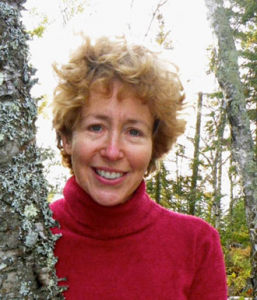2010 Lecture
“Climate Change, Boreal Forests, and the Legacies of History”
by Nancy Langston
 The 2010 Lynn W. Day Distinguished Lectureship welcomed Dr. Nancy Langston, Professor, Department of Forest and Wildlife Ecology, and Nelson Institute for Environmental Studies, at the University of Wisconsin-Madison. She serves on the Executive Committee of the Center for Culture, History, and Environment, and holds an affiliate appointment in the History Department at the University.
The 2010 Lynn W. Day Distinguished Lectureship welcomed Dr. Nancy Langston, Professor, Department of Forest and Wildlife Ecology, and Nelson Institute for Environmental Studies, at the University of Wisconsin-Madison. She serves on the Executive Committee of the Center for Culture, History, and Environment, and holds an affiliate appointment in the History Department at the University.
Southern boreal forests are becoming key sites of conflict in the 21st century, as concerns about global warming, industrial forestry, and pulp mill wastes capture public attention. For much of the 20th century, they were portrayed as naturally unhealthy forests, impoverished by their particular climates, soils, and disturbance regimes. Intensive management, foresters believed, might be able to rescue these forests, bringing them into a more modern and vigorous condition. In the past two decades, ecologists and environmentalists have challenged accepted views of boreal forest health, while introducing new metaphors of health and vulnerability into the conversation. In this talk, Langston will explore the legacies of history that we need to consider before embarking on ambitious new plans to manage boreal forests for climate change mitigation in an uncertain future.
Nancy Langston was initially trained as an ecologist rather than a historian. While on a National Science Foundation Pre-doctoral Fellowship at the University of Washington, she researched the evolutionary ecology of Carmine bee-eaters nesting along the Zambezi River in Zimbabwe. Her experiences in African conservation persuaded her that to understand (and reverse) environmental degradation, we needed to pay much closer attention to human communities. Understanding the historic roots of environmental change became her primary research focus.
Her first book, Forest Dreams, Forest Nightmares (University of Washington Press, 1995) examines the causes of the forest health crisis on western national forests. Where Land and Water Meet: A Western Landscape Transformed (University of Washington Press, 2003) focuses on dilemmas over riparian management in the West. Her third book, Toxic Bodies: Hormone Disruptors and the Legacy of DES, was published by Yale University Press in February 2010. Her current project is Changing Lake Superior: Forest, Fisheries, Global Warming, and Environmental Health.
The Lynn W. Day Distinguished Lectureship in Forest and Conservation History is sponsored by the Forest History Society, the Duke University Department of History, and the Nicholas School of the Environment.
For more information please contact Dr. James Lewis, Forest History Society historian, at (919) 682-9319.




